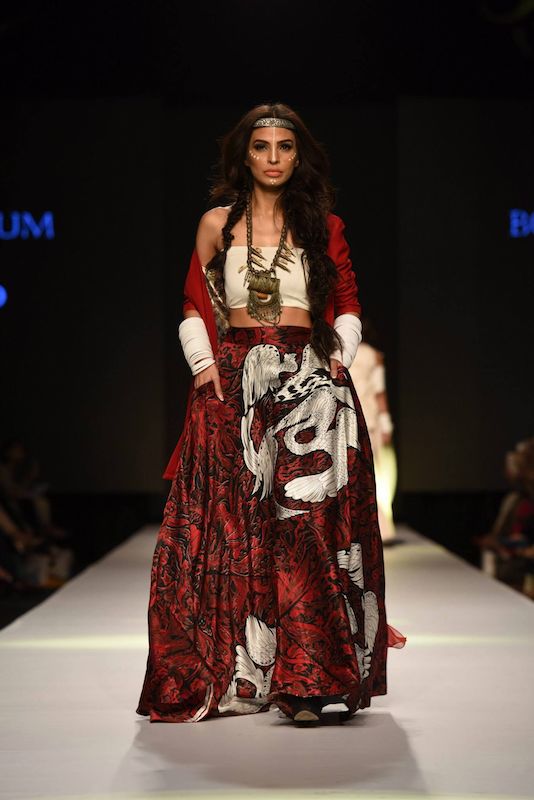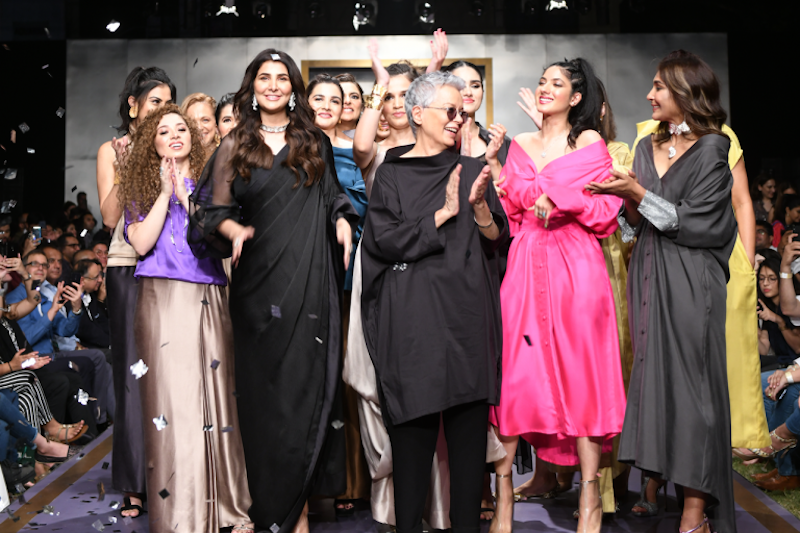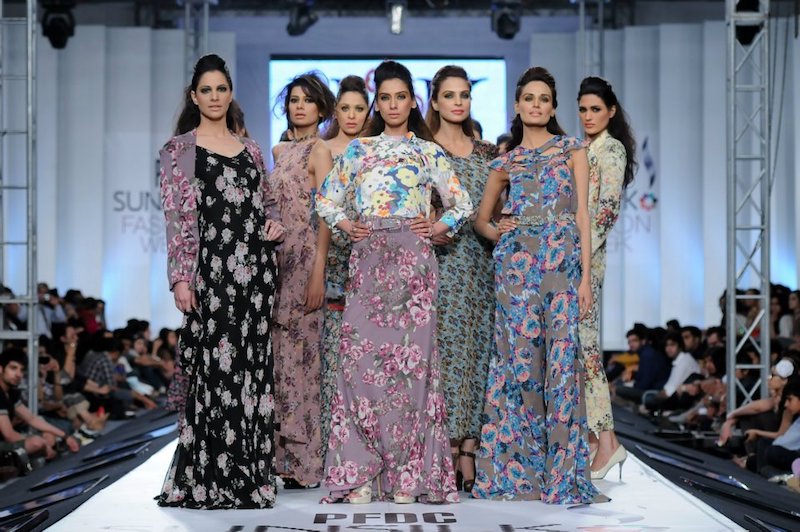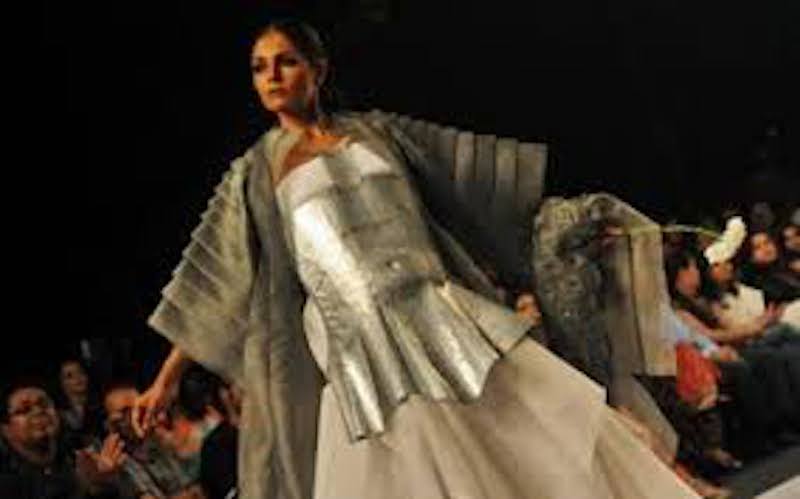As someone who has been reviewing fashion for almost 20 years, it dismays me to say that I can’t remember the last time I was wowed by a collection, in recent years. There are always some ‘better’ collections that feature one or two standout outfits but they’re all relative to an overall sea of obscureness and monotony. To actually sit up, overawed by a concept carried out via 16 well-developed styles, to actually see those styles make it from runways to retail, changing the way people dress. That hasn’t happened in a while. My memories of unforgettable and effective collections are very distant and very vague.
You don’t need a degree in rocket science to figure out why. Wedding wear is the biggest market in Pakistan and thus designers have been catering to that market to pay the bills. Bridals, however are not fashion, and cannot innovate nor set trends. The next biggest market, serving long and uncomfortable summers, is lawn. While designer lawn, having hit a ridiculous 5-digit price tag, is on a decline it’s needless to say that the few coveted labels will sell out come summer. Sustainability is integral for any brand to survive, so playing to the gallery is understandable and acceptable. But, and here’s the catch: how can any designer morally survive without designing and conceptualizing? Between weddings and summer, it seems designers have no desire to innovate. The little steam they have left only gives them wings to fuel and fly off on endless off-shore vacations. This pattern is more than evident at fashion weeks, which most of them sit out.

Body Focus Museum always managed to achieve aesthetic perfection.
What needs to happen? Fashion Weeks need to flaunt the real face of fashion, not the face of successful clothing entrepreneurs. There are names one is desperate to see back on the catwalks. Take Sonya Battla, for example. Her brand celebrates 20 years of fashion this year, her strength being politically referenced collections. I remember the landmarks she has designed over the years, from the ode to Karachi to WEAVE, an expression of indigo infusion celebrating our strengths in craft development. Iman Ahmed of Body Focus Museum is another name that belongs on the runway, spearheading trends, and yet has been underground of late. Sanam Chaudhri, because her Kage collection (2012) is unforgettable. Feeha Jamshed, because each and every one of her showings has been a reflection of her fashion forward self. Feeha is back in business; it would be great to get her back on the catwalk. It’s a travesty, if you think for a moment, that the new generation of bloggers and influencers has probably never even seen (or maybe even have heard) of these names.

Maheen Khan, it goes without saying, is nowadays the only brand that shows regularly and never disappoints. Currently reforming Fashion Pakistan Week as Chairperson, one hopes that Maheen will succeed in bringing ‘fashion’ back to the catwalk. Maheen is the longest standing, truest fashion designer Pakistan has and she knows exactly what fashion weeks need.
This doesn’t necessarily mean that present-day fashion weeks, whether in Karachi or Lahore, have nothing to celebrate. They have managed to create and maintain a space that should serve in design development but it is up to the designers to use it that way. Bridal and luxury designers like Sana Safinaz and Elan, for example, have the power and the prowess to take risks. They are financially stable enough to allow themselves innovation and adventure without necessarily walking the beaten path; and they do, every now and then. Design whizz Kamiar Rokni, who did take the pret a porter route in his last fashion week outing, must stay on it; there needs to be more Neo Folk in our lives. Misha Lakhani, Nida Azwer, Wardha Saleem…we have seen strong designs from them. Sania Maskatiya is perhaps one of the few names to have risen consistently and she’s a fashion week darling.

At a time when designer lawn was at a peak, Kamiar Rokni designed this print on print collection for fashion week, showing Pakistan how print could be made to look fashion forward.
There have been a couple of strong new names that we’ve seen emerge with potential; Hussain Rehar definitely being one who has impressed on the catwalk. Ammara Khan’s finesse can be seen in her collections, online and in campaigns, but she has yet to bring her vision for pret a porter to the runway.
The same applies to menswear. While celebrity infused shows, theatrics and gimmickry is all welcome now and then, it does need to be supported by solid design and two of the country’s biggest menswear designers have unfortunately stayed underground for far too long. Ismail Farid (his print campaigns still vouch for his flair) needs to be seen on a runway. Ahmed Bham, claiming to be on his way back as he opens a brand new store on Zamzama, is just as desperately needed to reflect a mature and savvy image of menswear in Pakistan. Menswear needs to move beyond costume and groom’s wear.

Sonya Battla’s collection, titled Karachi, was an expression of women empowerment. Accessorized by body armour, this image of Iraj went out globally, telling the world that Pakistani women had grit.
One cannot close the argument without mentioning high street brands; the few names that have headlined new trends and interesting concepts. Let’s keep them charged and alive. Generation, Khaadi (mostly Chapter 2 and Khaadi Khaas) and Zara Shahjahan are labels that have always managed to maintain the balance between commercial and creative success. We need to see more of them and hold them up as examples to follow.
- This article was first published in Instep on Jan 6, 2020



